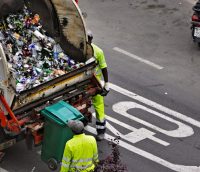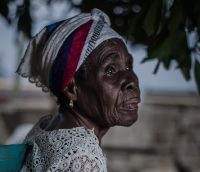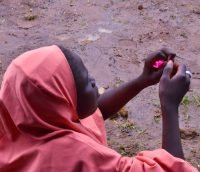 |
| Men watching from a gate. Image: The Daily Maverick |
I live in one of the poorer communities in Nigeria’s capital city, Abuja. Like most of the communities surrounding it, Jikwoyi is a densely populated area. Because most things – accommodation, food, clothing and transportation – is much cheaper than other areas in the Federal Capital Territory, it is not unexpected that there are more people who live around these areas and places like this.
One of the first things you notice about the neighborhood is that it pulses with activity and life; almost like a hive. People are always busy. Activity starts as early as 5am; earlier in fact. People who want to beat the eventual daily traffic jam leave as early as possible. And trust me…you don’t want to be in that traffic situation. So as early as 5am, you begin to see lots of cars heading out to town. Because the number of buses allocated to our part of town isn’t nearly enough to cater to the number of people in the area, many private vehicle owners pick up people as they head out to their ‘8-4’s or ‘9-5’s. It is an opportunity to make an extra N500 or N1,000; depending on the size of the car.
Shop owners also begin to open up for the day’s activities. Most notable are people whose businesses are in the food sector. They may not be catering to the early birds – unless they sell things like Akara, puff puff, massa or other such fried foods – but come 9am, most of the rush to head out would have begun to slow down and people who work in the community would need to eat.
And when school is in session, students pile the roads on their way to getting an education. They need to be catered to by provision store owners who sell biscuits, drinks, sweets, and other pacifiers children take these days. Or it could be to provide books, pencils and pens, or other necessities for school.
Soon after, other businesses open up for the day and Jikwoyi becomes a full hub of activity. It is not hard to tell that the soul of the community is driven by work.
What is surprising (to me) is that this work doesn’t seem to let up until late at night when I return home, which is usually between 8 and 9pm. In fact, if anything, it seems to pick up at night.
Lights blazing, open grills, loud noises as cars jostle to pass the narrow roads, hawkers and street vendors calling out their ware and people generally conversing in louder tones because of the racket of everything else that is going on is how you would describe Jikwoyi at night. The sounds of chaos and the smells of all sorts of food mixed with putrefying drainages and gutters greet you as soon as you return to the community.
Jikwoyi at night is bedlam. But it doesn’t end there.
There is an active night market scene in Jikwoyi. You can buy almost anything at the Jikwoyi Market from between 6pm and 9pm when some people begin to close up shop. So if you had a craving for Ogbono soup at 7pm, you wouldn’t have to worry about satisfying your craving because, not only are there a myriad of restaurants that sell the soup, the market will be open if you are the type to want to cook yourself.
I learned that many people who owned shops in the market – and the entire stretch of shops that are at the Jikwoyi junction and surrounding areas – are also those leaving the community at 5am to do their day jobs. To make this clearer, many people in this community leave for their offices in the day time and return home to their businesses to make a little extra cash before they go home at around 10pm (or later) so they can wake up again and set out for work at 5am the next day.
For these people, the rat race seems a bit unending.
In spite of all these, neighborhoods like Jikwoyi are home to some of the poorer people in Abuja. It is a mix of the extremely poor, people just above the red line of poverty and the aspiring middle class hoping for one move away to wealth and knowing that they could also be one move away from poverty. These types of neighborhoods are replicated everywhere in Nigeria and many parts of Africa.
But it gets worse. Neighborhoods like mine are only considered ‘poorer’ neighborhoods because they are in the Federal Capital Territory and because they pale in comparison to the suburbs at the city center. In reality, there are many more neighborhoods with people living in extreme poverty than there are neighborhoods like mine. And the people in these neighborhoods have to do even more to survive.
It is not hard to see that these are some of the most hardworking people in the community. They have to be up earlier and usually not by choice; they have to deal with some of the worst traffic as they leave for work; they juggle at least two jobs, with very little increase in income; they come back home through even more traffic at the end of the day; then they come home to their businesses in a quest to make even more money. In spite of all the work and time they are putting into their day jobs and night time businesses, many people in these types of neighborhoods will never get out of the poverty that they are mired in. The big question is…why?
For one, the economy isn’t helpful. Inflation means that the prices of goods and services is constantly going up. This wouldn’t be so bad if salaries are increasing concurrently. But they aren’t. Which means that you have to spend more out of the steady pay you are getting. Think rent, water, electricity, feeding, healthcare, spousal and family support and you know people have to work harder to make ends meet. And even though things are relatively cheaper across board in these types of neighborhoods, it is still a struggle to live comfortably. The question of saving doesn’t begin to come in.
So, people in these types of neighborhoods have to work harder, even though it translates to less money every month. And honestly, because many things do not work in Nigeria, the system connives to get these people to spend all their money and forces them to live from paycheck to paycheck. Which means that they are almost never able to live their current status, regardless of how hard they work.
How can the problem be solved?
It may be easy to say that people should get better jobs. However, most of our economies are not equipped to enable people do that. So, that is usually not a feasible option. The first thing I think needs to be done is to fix the economy; and all the sectors that feed into it. This requires investing into the education sector so that more people can access affordable and quality education which opens them for better opportunities for solution-driven career development, better jobs and more money. It also means, investing in healthcare so that citizens are sure that buffers like insurance are not a waste of money they could be using for something else. Then the government needs to create an enabling environment that allows all round development. This may include increasing roads leading to and from these neighborhoods to ease the time spent in traffic; affordable housing systems that allows people pay using the mortgage system; social cushions for people who are unable to work or who can’t find work at the time; and, many functioning revenue generating avenues so that the country, state, local government and community are able to take care of their citizens.
There is nothing wrong in working hard. And I know there are many people pushing the ‘smart work’ as opposed to ‘hard work’ theory but it is important to remember that these may be luxuries that the person mired in poverty is unable to take. Instead, we have to keep holding our government accountable and constantly require that they create an environment that allows growth, development and socio-economic growth. This is the only way poor people won’t work harder for so much less.





